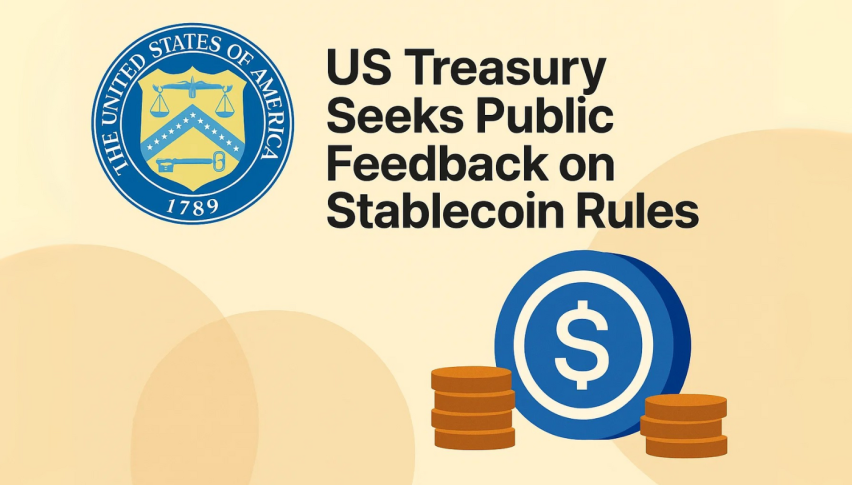US Treasury Seeks Public Feedback on Stablecoin Rules
The U.S. Treasury Department is asking the public to share feedback on how stablecoins should be monitored...

Quick overview
- The U.S. Treasury Department is seeking public feedback on monitoring stablecoins under the new GENIUS Act, which establishes the first federal framework for payment stablecoins.
- Comments are open until October 17, focusing on tools to detect and prevent illegal activities related to digital assets.
- Treasury Secretary Scott Bessent emphasized that stablecoins could enhance global access to the U.S. dollar and increase demand for Treasury securities.
- The GENIUS Act mandates that stablecoins be fully backed by U.S. dollars or liquid assets and includes annual audits for large issuers, amidst concerns from banking groups about potential risks.
The U.S. Treasury Department is asking the public to share feedback on how stablecoins should be monitored under the new GENIUS Act. The law, signed by President Donald Trump in July, is the first federal framework for payment stablecoins in the country.
Comments Open Until October 17
In a notice on Monday, Treasury invited people and organizations to submit ideas by October 17. The focus is on finding effective ways to detect and prevent illegal activity tied to digital assets.
Officials said they want input on tools like blockchain tracking, artificial intelligence, application programming interfaces (APIs), and digital identity checks. Once the comments are collected, Treasury will study them and share its findings with both the Senate Banking Committee and the House Financial Services Committee.
Bessent Ties Stablecoins to Dollar Strength
Treasury Secretary Scott Bessent called the consultation an “essential step” for keeping the U.S. ahead in digital assets. In a post on X, he said stablecoins will help spread access to the U.S. dollar around the world and increase demand for Treasury securities that back these tokens.
Implementing the GENIUS Act is essential to securing American leadership in digital assets.
Stablecoins will expand dollar access for billions across the globe and lead to a surge in demand for U.S. Treasuries, which back stablecoins.
It’s a win-win-win for everyone involved:… https://t.co/p5nRQpBfnw
— Treasury Secretary Scott Bessent (@SecScottBessent) August 18, 2025
“Stablecoins will expand dollar access for billions across the globe and lead to a surge in demand for U.S. Treasuries,” Bessent wrote, describing the move as a win for users, issuers, and the government.
GENIUS Act Sets the Ground Rules
The GENIUS Act requires that stablecoins be backed fully by U.S. dollars or liquid assets. It also makes annual audits mandatory for issuers holding more than $50 billion in circulation and adds oversight for foreign-issued tokens.
The law will take effect 18 months after being signed or 120 days after final rules are published by the Treasury and the Federal Reserve. This timing suggests the law will not be a major talking point in the 2026 midterm election campaigns.
Banking Sector Raises Concerns
Still, not everyone is convinced that the new framework will be smooth. Banking groups have warned that the law could accelerate the movement of deposits from banks into digital tokens. Analysts also noted potential loopholes in restrictions against paying interest to stablecoin holders, which they say could distort incentives.
Officials warned that the flight to stablecoins could pose a bigger threat than money market funds during the 2008 crisis, as it would be faster and easier for consumers to shift deposits..
Part of a Wider Crypto Push
The stablecoin bill is just one piece of a larger legislative package passed during the House’s “crypto week” in July. Alongside it, lawmakers approved the Digital Asset Market Clarity (CLARITY) Act and the Anti-CBDC Surveillance State Act. Both bills are now with the Senate, which reconvenes in September. Senate Banking leaders have already signaled they will advance their own version of the CLARITY Act by October.
A Pivotal Moment for Stablecoins
The GENIUS Act is the first crypto-focused bill signed into law under Trump and marks a turning point in U.S. regulation of digital assets. With public input now being gathered, Treasury will shape rules that balance innovation with safeguards against money laundering and other risks.
How the department responds could set the tone not just for U.S. markets but also for global approaches to stablecoin regulation.
- Check out our free forex signals
- Follow the top economic events on FX Leaders economic calendar
- Trade better, discover more Forex Trading Strategies
- Open a FREE Trading Account
- Read our latest reviews on: Avatrade, Exness, HFM and XM


